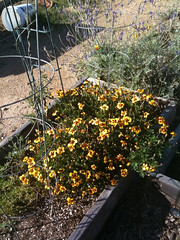Organic gardening is a great way to grow your own food at home and relax at the same time. But for someone just starting out it can seem very overwhelming, and even a little bit intimidating. How should a novice learn how to properly garden? Well, you are in luck; these tips will come in handy!
A great organic spray that will help discourage pests in your garden is mixing garlic, onion, or chives with water to create a spray. Mix chopped garlic, chives and onions into half a cup of water, and then place it in a spray bottle.
Your authenticity as an organic grower is solidified when you obtain the organic gardening certification. With this, you and your crops are credible and 100% legitimately organic. This is important for your business and to your customers. Obtaining this certification will give you further credibility as an organic gardener, boosting sales and proving to your customers that you provide only the best.
Construct raised flower beds of brick, stone, or wood. If you use wood, be sure that it is untreated and naturally rot resistant. Cypress, locust and cedar usually work best. Take care to avoid wood that has been chemically treated when your garden will hold vegetables, since unknown substances in the wood can make their way into your future food. If you have built a bed with treated lumber already, use a barrier such as plastic to line the bed.
For perennials, you can quickly get a plot developed in a short amount of time. Use a spade to cut swatches of turf free, turn them, and then bury the whole area under a thick layer of wood chips. Once a couple of weeks have passed, you can then dig into the new garden bed and plant some of your favorite perennials.
Make sure your trees are in a location near your house so that they give you a lot of shade. You can get more savings on energy bills because the shade you get from the trees will cool your home naturally.
Use fresh water to clean your vegetables, and then save this water for your garden. Tap and rain water are often void of many nutrients. When you use the water that was used to rinse your veggies, many of the nutrients from the raw veggies are retained within the water used, so when you dump this into your garden, it provides additional nourishment. Avoid using cleansers and utensils when you clean the vegetables.
Do not let your gardening chores add up. Even if you are too busy to tend to your gardens needs every day, you can try little things that will prevent you from having a lot of work when you return to your garden. For instance, pluck weeds while you take your dog outside or before getting in your car.
If you’re planning on gardening inside, the first thing you should consider is an adequate light source. If your residential space has limited sunlight, it will be best that you grow plants that are ideal for this type of environment. If the type of plant does not help, you can always use lights to help.
Don’t waste your rainwater! Trap rainwater in rain barrels, buckets or anything else that you have to use to water your garden. By using nature’s resources you can water your garden for free. Rainwater is abundant and free. Rainwater is a plant’s natural friend.
Mix one part milk with six parts water and spray this liquid on your plants regularly. This may help the plant by stopping powdery mildew from forming. This solution will keep for up to 21 days when stored in a refrigerator. You can spray your plants with this mixture once a day. Stop when the mildew disappears.
Plant twice- three weeks after planting tomatoes in the organic garden, plant more seeds. Doing this will keep your whole harvest from popping up at the same time. Furthermore, this method protects you in the event that your first batch doesn’t thrive as expected.
Consider using botanical pesticides to keep the pest that plague your garden under control. All insecticides are strong, including botanical ones. However, because botanical insecticides are biological, they often decay and disappear quickly.
It is economically smart to focus your gardening efforts on crops that would cost you more to buy at the supermarket. That being said, a plant that is valuable to one person may be of no value to another. If you grow plants that cost more to buy at the market, growing them will be a cost savings for you in the long run. So, plant what you love and save money at the same time.
Now that you’ve read this article, you may have a better understanding of why people enjoy organic gardening so much. Having a properly grown garden can be fun and relaxing. With the tips presented above at the forefront of your mind, you can begin to grow delicious organic produce like a professional
You have probably heard that compost is an effective fertilizer for organic gardens, but are you aware of what goes into compost? Compost is made up of things like old produce scraps, leaves, twigs, grass clippings and wood-chips that have broken down into something similar to soil in texture. Make some compost, and start using that rather than costly commercial fertilizers.
If you enjoyed reading this great article above written by one of our guest blog writers and are considering landscaping services for a home and live in Las Vegas, NV we’ll be very happy be of service to you! You can contact us here.


